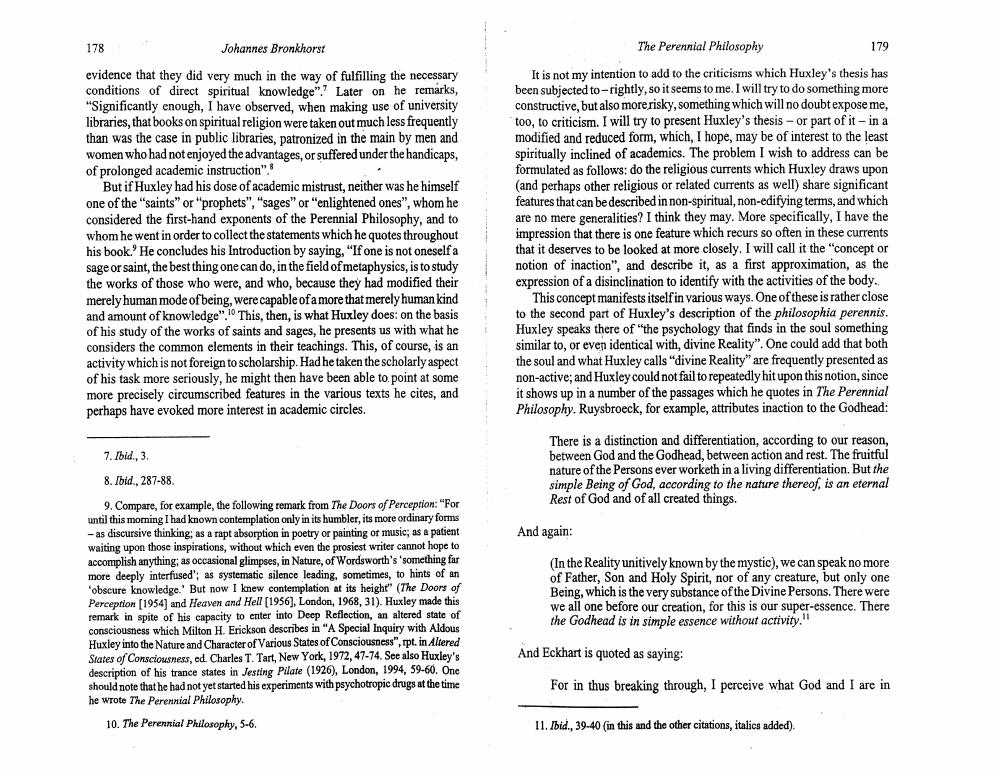Book Title: Perennial Philosophy And Law Of Karma Author(s): Johannes Bronkhorst Publisher: Johannes Bronkhorst View full book textPage 3
________________ 178 Johannes Bronkhorst The Perennial Philosophy 179 evidence that they did very much in the way of fulfilling the necessary conditions of direct spiritual knowledge". Later on he remarks, "Significantly enough, I have observed, when making use of university libraries, that books on spiritual religion were taken out much less frequently than was the case in public libraries, patronized in the main by men and women who had not enjoyed the advantages, or suffered under the handicaps, of prolonged academic instruction" But if Huxley had his dose of academic mistrust, neither was he himself one of the saints" or "prophets", "sages" or "enlightened ones", whom he considered the first-hand exponents of the Perennial Philosophy, and to whom he went in order to collect the statements which he quotes throughout his book.' He concludes his Introduction by saying, "If one is not oneself a sage or saint, the best thing one can do in the field of metaphysics, is to study the works of those who were, and who, because they had modified their merely human mode of being, were capable of a more that merely human kind and amount of knowledge". This, then, is what Huxley does on the basis of his study of the works of saints and sages, he presents us with what he considers the common elements in their teachings. This, of course, is an activity which is not foreign to scholarship. Had he taken the scholarly aspect of his task more seriously, he might then have been able to point at some more precisely circumscribed features in the various texts he cites, and perhaps have evoked more interest in academic circles. It is not my intention to add to the criticisms which Huxley's thesis has been subjected to-rightly, so it seems to me. I will try to do something more constructive, but also morerisky, something which will no doubt expose me, too, to criticism. I will try to present Huxley's thesis - or part of it - in a modified and reduced form, which, I hope, may be of interest to the least spiritually inclined of academics. The problem I wish to address can be formulated as follows: do the religious currents which Huxley draws upon (and perhaps other religious or related currents as well) share significant features that can be described in non-spiritual, non-edifying terms, and which are no mere generalities? I think they may. More specifically, I have the impression that there is one feature which recurs so often in these currents that it deserves to be looked at more closely. I will call it the "concept or notion of inaction", and describe it, as a first approximation, as the expression of a disinclination to identify with the activities of the body. This concept manifests itself in various ways. One of these is rather close to the second part of Huxley's description of the philosophia perennis. Huxley speaks there of the psychology that finds in the soul something similar to, or even identical with, divine Reality". One could add that both the soul and what Huxley calls "divine Reality" are frequently presented as non-active; and Huxley could not fail to repeatedly hit upon this notion, since it shows up in a number of the passages which he quotes in The Perennial Philosophy. Ruysbroeck, for example, attributes inaction to the Godhead: 7. Ibid., 3. There is a distinction and differentiation, according to our reason, between God and the Godhead, between action and rest. The fruitful nature of the Persons ever worketh in a living differentiation. But the simple Being of God, according to the nature thereof, is an eternal Rest of God and of all created things. And again: 8. Ibid., 287-88 9. Compare, for example, the following remark from The Doors of Perception: "For until this morning I had known contemplation only in its humbler, its more ordinary forms - as discursive thinking, as a rapt absorption in poetry or painting of music, as a patient waiting upon those inspirations, without which even the prosiest writer cannot hope to accomplish anything, as occasional glimpses, in Nature, of Wordsworth's something far more deeply interfused'; as systematic silence leading, sometimes, to hints of an 'obscure knowledge.' But now I knew contemplation at its height" (The Doors of Perception (1954) and Heaven and Hell (1956), London, 1968, 31). Huxley made this remark in spite of his capacity to enter into Deep Reflection, an altered state of consciousness which Milton H. Erickson describes in "A Special Inquiry with Aldous Huxley into the Nature and Character of Various States of Consciousness". pt. in Altered States of Consciousness, ed. Charles T. Tart, New York, 1972, 47-74. See also Huxley's description of his trance states in Jesting Pilate (1926), London, 1994, 59-60. One should note that he had not yet started his experiments with psychotropic drugs at the time he wrote The Perennial Philosophy. 10. The Perennial Philosophy, 5-6, (In the Reality unitively known by the mystic), we can speak no more of Father, Son and Holy Spirit, nor of any creature, but only one Being, which is the very substance of the Divine Persons. There were we all one before our creation, for this is our super-essence. There the Godhead is in simple essence without activity." And Eckhart is quoted as saying: For in thus breaking through, I perceive what God and I are in 11. Ibid., 39-40 (in this and the other citations, italics added)Page Navigation
1 2 3 4 5 6 7 8
